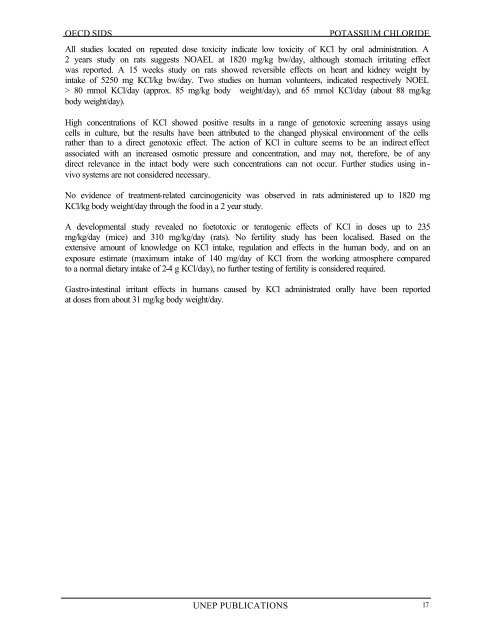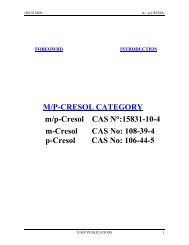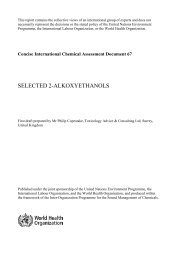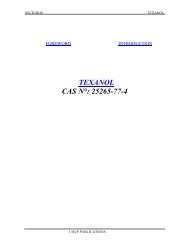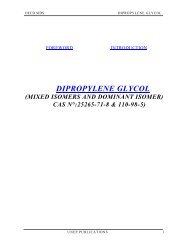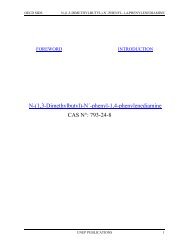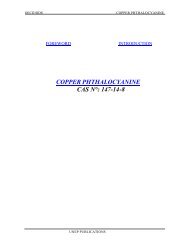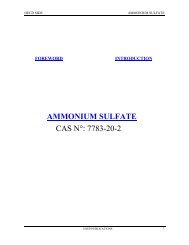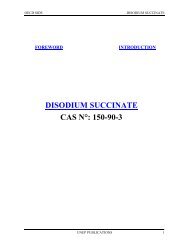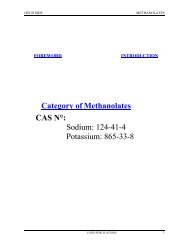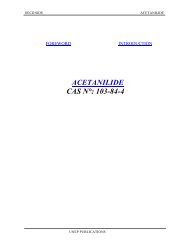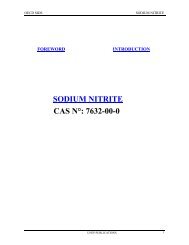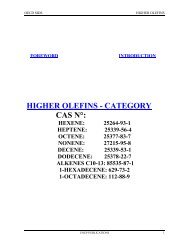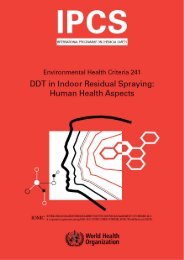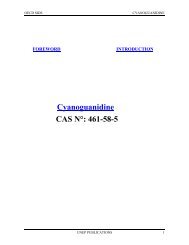POTASSIUM CHLORIDE CAS N°: 7447-40-7
POTASSIUM CHLORIDE CAS N°: 7447-40-7
POTASSIUM CHLORIDE CAS N°: 7447-40-7
Create successful ePaper yourself
Turn your PDF publications into a flip-book with our unique Google optimized e-Paper software.
OECD SIDS <strong>POTASSIUM</strong> <strong>CHLORIDE</strong><br />
All studies located on repeated dose toxicity indicate low toxicity of KCl by oral administration. A<br />
2 years study on rats suggests NOAEL at 1820 mg/kg bw/day, although stomach irritating effect<br />
was reported. A 15 weeks study on rats showed reversible effects on heart and kidney weight by<br />
intake of 5250 mg KCl/kg bw/day. Two studies on human volunteers, indicated respectively NOEL<br />
> 80 mmol KCl/day (approx. 85 mg/kg body weight/day), and 65 mmol KCl/day (about 88 mg/kg<br />
body weight/day).<br />
High concentrations of KCl showed positive results in a range of genotoxic screening assays using<br />
cells in culture, but the results have been attributed to the changed physical environment of the cells<br />
rather than to a direct genotoxic effect. The action of KCl in culture seems to be an indirect effect<br />
associated with an increased osmotic pressure and concentration, and may not, therefore, be of any<br />
direct relevance in the intact body were such concentrations can not occur. Further studies using invivo<br />
systems are not considered necessary.<br />
No evidence of treatment-related carcinogenicity was observed in rats administered up to 1820 mg<br />
KCl/kg body weight/day through the food in a 2 year study.<br />
A developmental study revealed no foetotoxic or teratogenic effects of KCl in doses up to 235<br />
mg/kg/day (mice) and 310 mg/kg/day (rats). No fertility study has been localised. Based on the<br />
extensive amount of knowledge on KCl intake, regulation and effects in the human body, and on an<br />
exposure estimate (maximum intake of 1<strong>40</strong> mg/day of KCl from the working atmosphere compared<br />
to a normal dietary intake of 2-4 g KCl/day), no further testing of fertility is considered required.<br />
Gastro-intestinal irritant effects in humans caused by KCl administrated orally have been reported<br />
at doses from about 31 mg/kg body weight/day.<br />
UNEP PUBLICATIONS 17


